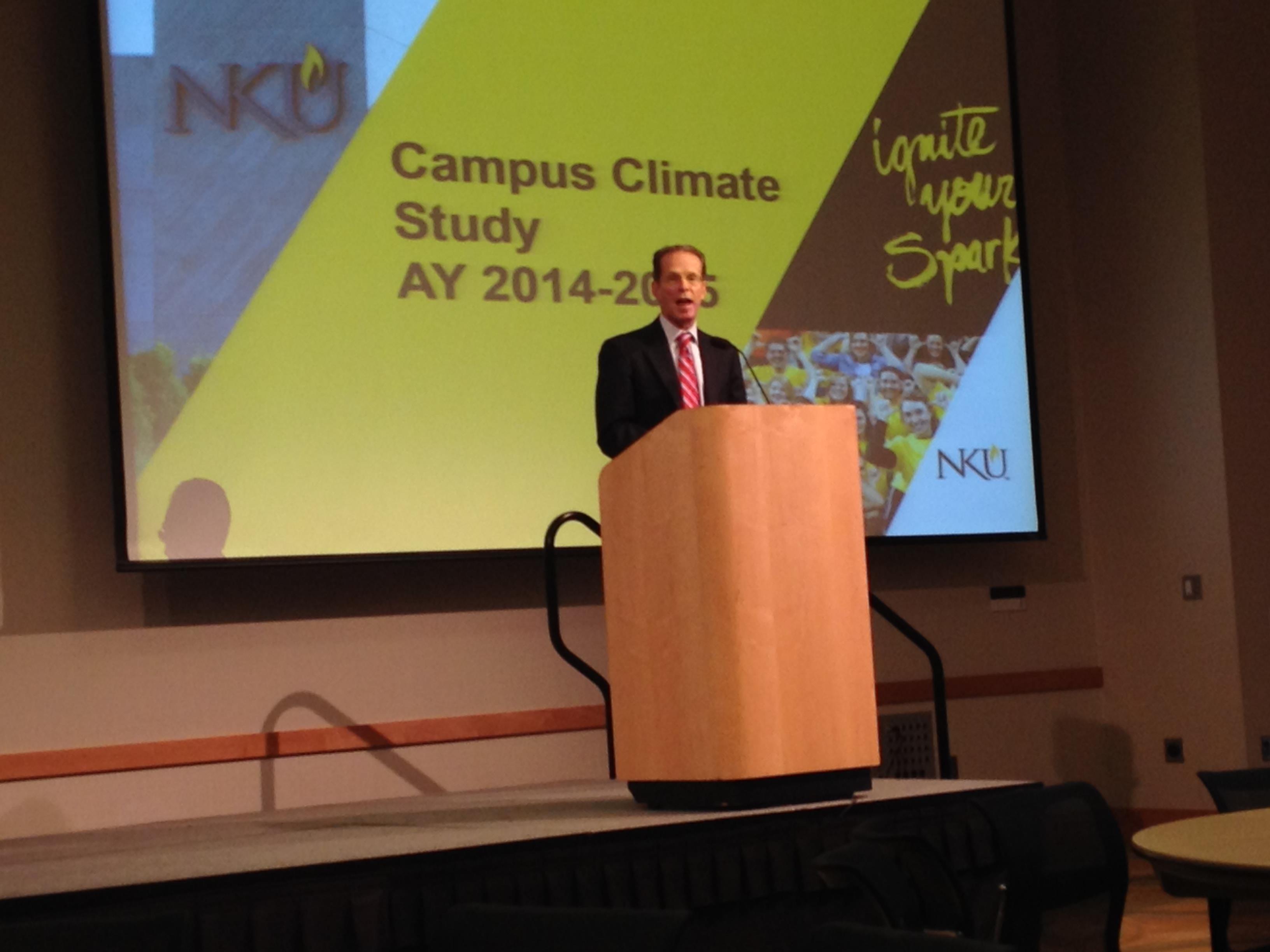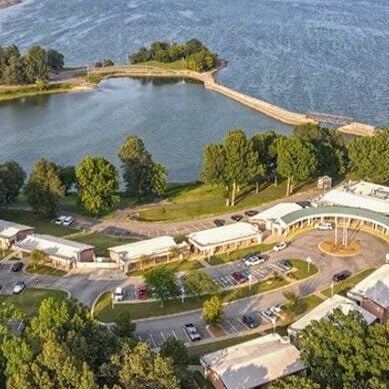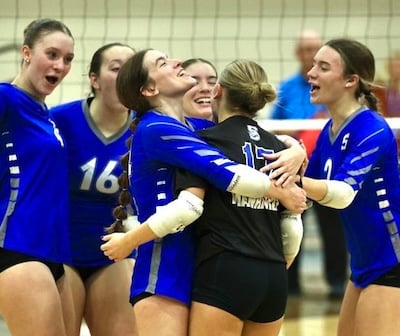By Mark Hansel
NKyTribune managing editor
A new Northern Kentucky University Campus Climate Study indicates faculty and staff are concerned about the direction of the university and believe the administration has nurtured a ‘culture of fear.’
The study included 2,242 respondents, which was made up of 1,295 students (9 percent), 380 faculty (37 percent) and 484 staff members (47 percent).
The survey findings were introduced Monday by Kathleen Roberts, Senior Advisor to the President for Inclusive Excellence and Title IX Coordinator to a campus-wide meeting.
The findings were presented by Brandelyn Tosolt, an associate professor in the College of Education and Human services and Caroline Macke assistant professor in the social work program and former director of the B.S.W. degree.
The last campus climate study at NKU was conducted in 2010.
Faculty and staff cited different reasons for believing a culture of fear exists at NKU.

For staff, the concern was focused on restructuring and outsourcing.
“I’m currently looking for a new job outside of NKU and can no longer provide for my family working here,” was a comment from one staff member.
Tosolt said for faculty members, the culture of fear focused on repercussions for speaking out, as evidenced by this comment:
“Even as I type this, part of me believes, despite the security statement to the contrary, that someone will find out who I am and fire me for expressing these ideas.”
Other concerns among faculty and staff included bullying, negative experiences with human resources and the need for an ombudsperson.
One faculty member expressed the need for an ombudsperson through this statement:
“Faculty who feel they are the victims of bullying, either by faculty or by administrators, must have a place to go with their concerns, must have guidance and must have support. There is a climate of fear, particularly among non-tenured faculty, who fear they cannot confront the bullies, without risking negative effect on their tenure process.”
“Even as I type this, part of me believes, despite the security statement to the contrary, that someone will find out who I am and fire me for expressing these ideas,” an NKU faculty member wrote on the survey.
Other concerns that were identified include a perceived shift in the focus of NKU, from a teaching to a research university, and the hiring of new administrators without providing raises for faculty and staff.
A faculty member offered this observation:
“When I began teaching here, I was proud to be at an institution where students would obtain a good education at a price that they could avoid debt. The growing pains of the last few years, especially the growth of the administration at the cost of the teaching mission, have left me wondering whether anyone knows what the purpose of the college is. We seem to have turned into a big business whose purpose is to process as many students as possible.”
In response to the question, “Would you recommend NKU?”, 89 percent of staff, 78 percent of faculty and 76 percent of students responded affirmatively, but there was a qualifier.
Participants believe the university provides a positive experience for students, but comments regarding the environment for faculty and staff were less encouraging.
One respondent offered this remark:
“I would recommend NKU to a student who wanted to come to school here, but I wouldn’t recommend NKU to a person who is starting their career.”
Strengths identified by students, faculty and staff included the university’s caring and family atmosphere, campus infrastructure, which includes buildings, location, affordability and safety and the breadth of academic offerings. Supportive people and offices, big-campus amenities with a small campus feel and student-faculty relationships were also seen as positives.
For purposes of the survey, campus climate was defined as the way in which students, faculty and staff perceive NKU, especially as it pertains to diversity.
That included perceptions about safety, prejudice, equal opportunities, university commitment to diversity, discrimination, support, a sense of belonging and fair and respectful treatment.
In his welcoming remarks at Monday’s presentation, NKU president Geoffrey Mearns focused on inclusiveness at the university, which he identified as a core value of the university plan that was developed in 2013.
“Since the plan was approved in 2014, we’ve taken several steps together to achieve that goal,” Mearns said. “We’ve created the office of LGBTQ programs and services, we’ve reorganized several units within student affairs into the center for student inclusiveness (and) we’ve continued to enroll an increasing number of diverse students.
Mearns left before the presentation was finished and did not comment on faculty and staff concerns during his opening remarks. He said the survey and presentation was designed to serve two purposes.
“One is really to learn more about the experiences of people…on our campus,” Mearns said. “Second (is) to understand those experiences better, so that we can develop some specific steps, some specific strategies to enhance and continue to increase our commitment to a welcoming and inclusive community.”
Many faculty and staff members who responded to the survey, however, saw an opportunity to express concerns they have been unable or unwilling to express to the administration.
The ‘culture of fear’ among staff and faculty has been a hot topic in private conversations for some time. The anonymity of the survey provided a forum for those who are reluctant to speak publicly.
Questions dealing with job satisfaction, morale and the direction of NKU also indicated dissatisfaction among many faculty and staff members.
Only in the category of job satisfaction, did more than half of the participants (52 percent of faculty and 56 percent of staff, respectively) give a “high” rating.
In the category of morale, 63 percent of faculty and 58 percent of staff rated the university low or medium. When asked about the direction of the university, 70 percent of faculty and 61 percent of staff rated the university low or medium.
Faculty respondents were especially critical in those categories, with 44 percent giving the university a “low” rating in each.
At the conclusion of the presentation, those in attendance were encouraged to engage in table discussions and offer suggestions based on the survey findings.
David Thomson, internship coordinator in the department of communications, said a lot of the angst comes from the belief that educators are not part of the growth at the university.
He points to the addition of new buildings around campus and, while he recognizes the university has to take funding where it can get it, teachers, many of whom have not received pay increases for several years, “should not be left behind.”
“The state and a lot of other people tend to be very willing to put buildings on campuses,” Thomson said. “My question is, who do you pay to staff those buildings so that they will stay and build your core faculty? That’s becoming a real problem.”
Another longtime faculty member who attended the campus-wide meeting, asked not to be identified and told the NKyTribune, “NKU’s administration will not take responsibility for their problems and the ‘culture of fear’ and administrative bloat they have created. The fear and intimidation are well documented in the survey . ..How will they respond to this data and the deep problems?
“I doubt anything will come of this. I expect more staff and faculty ‘reprogramming’ events where we are required to attend and waste our time. These have been common the last few years.”




















I want my NKU back. NKU is broken. As a longtime employee I am appalled at the current direction of the University and its failed administration. At the top of this mess we have the Board of Regents–a group of dubious characters who are chaired by a slumlord scoundrel of trailer parks. Then we have a fraud of a President who parades around as some kind of crusader for justice when in fact he has done nothing but advance his bogus agenda and put into place a group of self important malignant buffoons. At best they are incompetent speculators who take credit for the hard work and accomplishments of the people they suck the spirit out of. Our students are suffering as resources are funneled to these fat self important administrators. A perfect example is our Provost–a public servant but one of the highest paid women in the state of KY (she boasts about this regularly) who surrounds herself with a cast of merry pranksters and do nothings that operate for her entertainment, at the cost of the public and student tuition dollars. You can review her outrageously low evaluations at: http://www.scribd.com/doc/267553380/Faculty-survey-on-NKU-Provost-Sue-Ott-Rowlands . As in her tenure at Virginia Tech, at NKU the Provost has brought a system that promotes the people she likes on whatever ad hoc basis she likes (for details see: https://www.thefire.org/virginia-tech-round-2-staging-diversity/). Why is the Kentucky public supporting this cast of characters? Look out if you speak truth to power, you will be eliminated. That is the new normal at NKU. Below the Provost is a supporting cast of Deans who are by and large despised by the staff and faculty that report to them. The most poorly ranked among them is the Dean of the largest college–Arts and Sciences. Her evaluations by faculty and staff are the worst in NKU’s history. Again, I want my NKU back. These career administrators are destroying our university at the expense of the public and the students “we promise” to serve. We all know that rolling the dice and kicking this lot out could result in the arrival of an even more insidious crew, but things are so bad, it worth turning up snake eyes.
Maurice and Jeffrey, many thanks for adding these insights which speak to even broader problems at Northern Kentucky University.
The article very accurately classifies the climate of fear on NKU’s campus. Morale is incredibly low and the institution seems to be rudderless. As a result, as Jeffrey noted above, students are leaving to attend other Universities (especially UC; a far from perfect place, but at least one where the administration is willing to lead and to admit mistakes rather than covering them up; vis a vis NKU where the recent “gun” incident, and numerous other incredibly callous failings – all documented by The Northern Kentucky Tribune – are stacking up).
Moreover, and this really is chilling stuff that supports what Maurice added in his comment, staff and faculty at NKU are “disappearing” at regular intervals; and with no explanation. One can only surmise that those people somehow crossed NKU’s duplicitous administration.
The take-away is this… Be careful if you choose to speak out against any injustice or administrative fiat; you do so at your own peril. Mark Hansel needs to ask around campus – everyone knows of someone who’s been “disappeared.”
On a separate but related point, NKU staff, the dedicated women and men who helped to build and to shape the University, are are being let go (in some cases just before they are fully vested in their retirement plans) and replaced with younger, cheaper workers, or made to re-apply, as Maurice noted, for their old job at a much reduced salary. This new model is as destructive as it is contrary to the common good of the University and the students who are supposed to be served by it.
At one time, NKU was known for spectacular teaching, small class sizes and its close relationships with the communities that make up this region. Now, it’s hard to say what it’s known for, even as the administration spent hundreds of thousands of dollars on an incredibly bland re-branding scheme.
And, I ask the readers of this article, and the administration at NKU:
1. Why are consulting corporations (from marketing firms to legal teams) from Ohio almost always hired over their counterparts in Kentucky? Isn’t Kentucky talent good enough?
2. Why is the administration spending hundreds of thousands of dollars hiring firms based in the North East to consult on new budget models and on how monies are dispersed at the College and Department levels?
3. Why does NKU even bother employing an internal CFO with a massive support team if outside consultants do their work for them?
4. Why are so many new administrators being hired?
5. Why are the traditional disciplines being decimated?
Also missed was the Job Action Questionnaire (JAQ) trick of changing one’s job by a line or two, making one reapply and IF you get the job back having your NKU retirement contribution rolled back to beginning levels since you are technically a new employee. One wonders why more budget heads didn’t role after the athletic director scandal. How about the SSK (co owned by the chair of the Regents) trailer park lawsuit?
I’m surprised that neither the survey nor the reporter for this story picked up on the very common belief among faculty and staff that much of the university’s current financial weakness derives from the rash decision by the Board of Regents several years ago to move NKU athletics to the NCAA’s Division One without insuring that the private funding was there to pay for the hugely increased athletic budget. When faculty and staff wondered if the timing was right for this transition, we were assured that it would have no negative impact on funding for non-athletic parts of the budget because the millions of dollars involved would be forthcoming from private sources. The administration has never succeeded in proving that those donations have matched expectations, and in the opinion of many faculty and staff the resulting shortfalls in funding for academic programs and personnel have seriously weakened NKU’s heretofore celebrated “up close and personal” educational opportunities. And that could lead to further problems with student retention, eroding NKU’s financial position even more, since retention is increasingly becoming a crucial factor in the state’s funding model for higher education. Is it any wonder that faculty and staff morale is low, given this background?